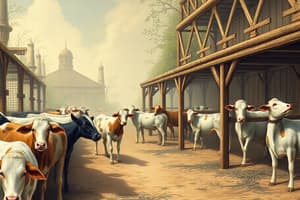Podcast
Questions and Answers
What is a characteristic of barns with windows or ventilators?
What is a characteristic of barns with windows or ventilators?
- Uncomfortable for animals
- Hygienic environment (correct)
- Increased disease prevalence
- Limited air flow
Why are tie stalls phased out in dairy cattle barns?
Why are tie stalls phased out in dairy cattle barns?
- To increase animal welfare (correct)
- To reduce overall barn size
- To improve milking efficiency
- To limit access to water
What is the primary purpose of deep litter poultry or pig housing systems?
What is the primary purpose of deep litter poultry or pig housing systems?
- To limit animal movement
- To ensure continual air flow
- To restrict access to bedding material
- To provide bedding material for animals (correct)
How do loose housing systems differ from tie stalls?
How do loose housing systems differ from tie stalls?
What is the effect of continual air flow in barns?
What is the effect of continual air flow in barns?
Why are barns with windows or ventilators preferred in animal housing?
Why are barns with windows or ventilators preferred in animal housing?
In conventional barns, where are dairy cattle often kept?
In conventional barns, where are dairy cattle often kept?
What is the primary reason repeated spreading of straw or sawdust is done in deep litter poultry housing systems?
What is the primary reason repeated spreading of straw or sawdust is done in deep litter poultry housing systems?
Why do loose housing systems provide more freedom for animals?
Why do loose housing systems provide more freedom for animals?
What is one benefit of loose housing systems over tie stalls?
What is one benefit of loose housing systems over tie stalls?
Flashcards are hidden until you start studying
Study Notes
Importance of Proper Planning
- Inadequate planning leads to additional labor charges and increased maintenance costs
Orientation of Animal Houses
- Two types of orientation: East-West and North-South
- East-West orientation:
- Helps avoid direct sunlight
- Feed and water troughs can be placed under shade all day
- Increases feed consumption and manure production in shade
- North-South orientation:
- Sun strikes every part of floor area at some time of the day
- Keeps floor area dry
- Preferred if paving is too costly
Floor Design
- Extremely important part of the building
- Should be laid on solid and compact foundation
- Foundation should be made of stones with a smooth inner side
- Good sanitary control measures should be taken into account in design
- Ideal floor characteristics:
- Well-drained
- Made of cement concrete
- Non-slippery with grooves and roughened surface
- Facilitates hygienic feeding and effective waste removal
Wall Design
- Should protect farm animals from draft
- Should be hard and durable, preferably made of cement concrete
- Inside walls should have a smooth, hard finish to prevent dust and moisture accumulation
- Avoid constructing corners or projections that may injure animals
- Can be made of local materials like wood and bamboo
- Wood walls should be painted with wood preservative solution every 3-5 years
- Walls may be solid or partially open depending on local conditions and animal type
Roof Design
- A well-designed roof is crucial for reducing heat and cold stresses
- Should be made of galvanized iron-sheet for durability and comfort
- Can be made of local materials like thatches
- Should be high enough to release excess heat, moisture, and pollutants
- Should be sloped with an overhang of at least 60 cm to offer protection from sun and rain
- Direct solar radiation increases heat load on animals, affecting production and reproduction
Ventilation
- Defined as the entry and circulation of air freely
- Essential for supplying animals with fresh air and removing noxious and toxic gases
- Adequate ventilation system is a must in all farm animal houses to avoid dampness
Studying That Suits You
Use AI to generate personalized quizzes and flashcards to suit your learning preferences.




